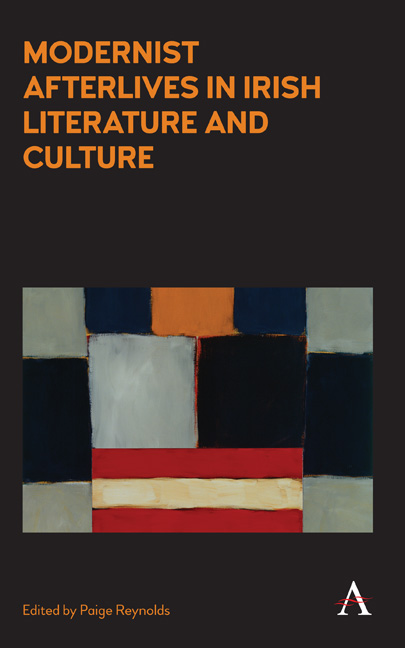Book contents
- Frontmatter
- Contents
- List of Figures
- Acknowledgements
- Introduction
- Section One LITERATURE AND LANGUAGE
- Section Two INSTITUTIONS, ART AND PERFORMANCE
- Chapter 7 ‘Make a Letter Like a Monument’: Remnants of Modernist Literary Institutions in Ireland
- Chapter 8 Storm in a Teacup: Irish Modernist Art
- Chapter 9 ‘Particles of Meaning’: The Modernist Afterlife in Irish Design
- Chapter 10 Animal Afterlives: Equine Legacies in Irish Visual Culture
- Chapter 11 Choreographies of Irish Modernity: Alternative ‘Ideas of a Nation’ in Yeats's At the Hawk's Well and Ó Conchúir's Cure
- Chapter 12 The Modernist Impulse in Irish Theatre: Anu Productions and the Monto
- Afterword: The Poetics of Perpetuation
- Notes on Contributors
- Index
Chapter 7 - ‘Make a Letter Like a Monument’: Remnants of Modernist Literary Institutions in Ireland
from Section Two - INSTITUTIONS, ART AND PERFORMANCE
Published online by Cambridge University Press: 22 July 2017
- Frontmatter
- Contents
- List of Figures
- Acknowledgements
- Introduction
- Section One LITERATURE AND LANGUAGE
- Section Two INSTITUTIONS, ART AND PERFORMANCE
- Chapter 7 ‘Make a Letter Like a Monument’: Remnants of Modernist Literary Institutions in Ireland
- Chapter 8 Storm in a Teacup: Irish Modernist Art
- Chapter 9 ‘Particles of Meaning’: The Modernist Afterlife in Irish Design
- Chapter 10 Animal Afterlives: Equine Legacies in Irish Visual Culture
- Chapter 11 Choreographies of Irish Modernity: Alternative ‘Ideas of a Nation’ in Yeats's At the Hawk's Well and Ó Conchúir's Cure
- Chapter 12 The Modernist Impulse in Irish Theatre: Anu Productions and the Monto
- Afterword: The Poetics of Perpetuation
- Notes on Contributors
- Index
Summary
Much like literary forms, the institutions that create and sustain literature have significant afterlives. The efforts of editors, publishers and booksellers resonate beyond their time, and their successors inherit the traditions, structures and technologies of the trade. Modernism's publishing legacy lives in the little magazines, manifestos and private presses that embodied the movement, and later publishers and authors have reappropriated and translated these artefacts and institutions to meet the specific conditions of their moment. Increasingly, narratives of modernism have recognized the publishers, booksellers and patrons responsible for producing the books, periodicals and ephemera of the era. These institutions and actors shaped modernist literature by providing its material manifestation, and the format of these works fashioned the reading experiences of subsequent writers. If modernism began in the magazines, as Robert Scholes and Clifford Wulfman have argued, succeeding generations monumentalized and repurposed the publishing tactics that commenced the era.
Mid-century literary publishing in Ireland gathered together the remnants of collapsed modernist experiments, most notably the Cuala Press (1902– 46). A leading publisher of the Irish Revival, the Cuala Press printed much of W. B. Yeats's oeuvre and raised the standards for Irish book production through a reinvention of print tradition and a focus on contemporary economic and cultural needs. Later the Dolmen Press (1951– 87) revived its logics to rejuvenate a barren literary environment in mid- twentieth-century Ireland. Beginning as an intimate collaboration between printer and poet, the Dolmen Press grew to be the preeminent poetry press of its time and was internationally renowned for its craftsmanship and support of Irish writing. Like the Cuala before it, the Dolmen utilized the private- press model to create book-shaped monuments to modernism. In a time when many writers were openly hostile to influences of this earlier movement, the institutions of literary publishing more fully embraced modernist strategies and the international reputations of their writers. The Dolmen adopted and revised the fine- press tradition and aesthetic aims of the Cuala, and it united the beautiful book with literary content that celebrated the work of contemporary Irish writers alongside the titans of high modernism. In doing so, the Dolmen resumed the modernist tendency to conceptualize Irishness within a cosmopolitan framework.
- Type
- Chapter
- Information
- Modernist Afterlives in Irish Literature and Culture , pp. 93 - 110Publisher: Anthem PressPrint publication year: 2016



